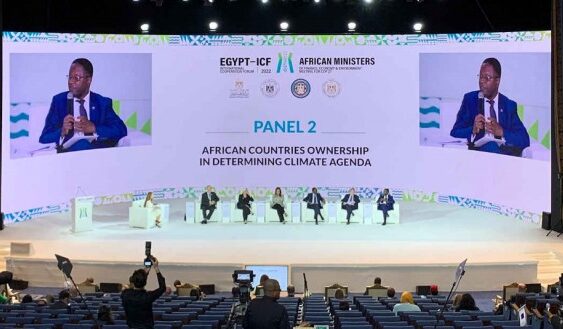- FORMER TOGO PLAYER ADEBAYOR LAUNCH SOCIAL HOUSING PROJECT IN TOGO
- AMANSIE WEST DISTRICT ROAD PROJECT BEGINS IN GHANA
- LAGOS TO CALABAR HIGWAY PROJECT: WHY IT CANT BE ACHIEVED
- NPA SECURE US$700M LOAN FROM CITIBANK FOR REHABILITATION OF APAPA & TIN-CAN PORT
- LIBERIA SENATE TO PROBE WORK MINISTRY OVER UNAUTHORIZED AWARD OF OVER US$21M ROAD CONTRACTS
CLIMATIC CHANGE COSTING AFRICA 15% PER CAPITA GDP

Kevin Urama, African Development Bank’s acting chief economist, recently said that Africa has been losing between 5% to 15% of its GDP per capita year-on-year growth due to climate change.
Speaking during a panel discussion at Egypt International Cooperation Forum (Egypt-ICF 2022), Urama stated that African countries need to mobilize $1.6 trillion between 2022 and 2030 to meet their national commitments to address the “climate financing gap.”
“Collectively, African countries received only $18.3 billion in climate finance between 2016 and 2019,” AfDB’s chief economist said in Cairo, explaining that the continent has been facing “a climate finance gap of up $1288.2 billion annually from 2020 to 2030.”
While Africa contributes to only 3% of global emissions, Urama argues, it has been bearing the brunt of the worldwide climate crisis. “The global community must meet its $100 billion commitment to help the developing countries and African economies to mitigate the impacts of the climate change and to adapt to it,” he argued.
While these investments are expected to accelerate Africa’s transition toward clean energy by investing in renewable energy, Urama says that gas must be included in the continent’s energy transition plans which started in the 1850s with the gradual phase-out of coal.
The economist’s comments on the continuous use of gas echo the previous recommendation of a technical committee of the African Union, which proposed a regional strategy that promotes fossil gas and nuclear energy as “green” energy sources ahead of COP 27.
The committee’s recommendations were welcomed by African Union leaders, a move that was described as “shameful” and “unacceptable” by a coalition of African NGOs working on environmental issues.
Despite the ongoing disagreements on whether the use of gas and nuclear energy during the energy transition phase is considered to be acceptable, many African countries have tried to invest more in renewable energy technology as it is incrementally getting cheaper.
However, the fight against climate change “cannot rely on the government alone, nor the private sector alone but it’s an integration between the government, civil society, and the private sector,” says Yasmine Fouad, Egypt’s minister of environment.
Echoing Fouad’s sentiment, Ghada Wally, executive director of the United Nations Office on Drugs and Crime, has maintained that “women and young people are among Africa’s best assets” in the fight to advance sustainable development across the continent.
SOURCE: Moroccoworldnews

